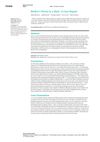 October 2024 in “Eurasian Journal of Medicine”
October 2024 in “Eurasian Journal of Medicine” Hashimoto’s thyroiditis is more common in girls, often after puberty, and can cause neck swelling, fatigue, and hair loss.
 October 2024 in “Journal of the Endocrine Society”
October 2024 in “Journal of the Endocrine Society” ACTH-dependent Cushing's syndrome linked to metastatic cervical cancer is rare and has high risks.
 October 2024 in “Journal of the Endocrine Society”
October 2024 in “Journal of the Endocrine Society” Hashimoto's thyroiditis can sometimes change to Graves' disease, so patients need careful monitoring.
 August 2024 in “International Journal of Dermatology”
August 2024 in “International Journal of Dermatology” New therapies and treatments for hair disorders, especially in curly hair, show promise.
 July 2024 in “International Journal of Dermatology”
July 2024 in “International Journal of Dermatology” New methods and treatments for skin and hair disorders are being explored.
 July 2024 in “Skin Research and Technology”
July 2024 in “Skin Research and Technology” The products significantly promote hair growth and maintain hair bulb health.
 June 2024 in “Bőrgyógyászati és Venerológiai Szemle”
June 2024 in “Bőrgyógyászati és Venerológiai Szemle” New treatments for hair loss, like JAK inhibitors, PRP, anti-androgens, and minoxidil, offer better options.
May 2024 in “International Society of Hair Restoration Surgery”  April 2024 in “Frontiers in endocrinology (Lausanne)”
April 2024 in “Frontiers in endocrinology (Lausanne)” Melatonin improved secondary hair growth in goats but didn't affect primary hair density or litter size.
 March 2024 in “Journal of the Dermatology Nurses’ Association”
March 2024 in “Journal of the Dermatology Nurses’ Association” Low-dose oral minoxidil is being revisited as a promising hair loss treatment.

A woman and her guinea pig were successfully treated for a fungal infection.
 January 2024 in “Hair transplant forum international”
January 2024 in “Hair transplant forum international” The document's content could not be processed.
 November 2023 in “Deleted Journal”
November 2023 in “Deleted Journal” Multimedia education greatly improves women's knowledge and management of PCOS.
 October 2023 in “Spectrochimica acta. Part A, Molecular and biomolecular spectroscopy”
October 2023 in “Spectrochimica acta. Part A, Molecular and biomolecular spectroscopy” New, eco-friendly methods accurately measure TDF and FNS in a new urologic medication.
 October 2023 in “Journal of the Endocrine Society”
October 2023 in “Journal of the Endocrine Society” A woman was diagnosed with Sheehan's syndrome and a rare complication of diabetes insipidus 33 years after symptoms began, improving with hormone therapy.
 September 2023 in “Journal of movement disorders”
September 2023 in “Journal of movement disorders” Dopaminergic therapy in Parkinson's disease patients is linked to increased hair loss.
 September 2023 in “Curēus”
September 2023 in “Curēus” A 21-year-old male has a benign skin condition called Becker's nevus, which he chose not to treat.

The case shows the difficulty in diagnosing certain conditions when standard tests are negative.
 July 2023 in “Research Square (Research Square)”
July 2023 in “Research Square (Research Square)” Two patients got Cushing's syndrome after treatment with Triamcinolone Acetonide for mouth fibrosis, but recovered after stopping the treatment.
 July 2023 in “Hair transplant forum international”
July 2023 in “Hair transplant forum international” The document's content could not be read or understood.
 June 2023 in “International Journal of Pharmaceuticals Nutraceuticals and Cosmetic Science”
June 2023 in “International Journal of Pharmaceuticals Nutraceuticals and Cosmetic Science” New information shows Valproate may protect the brain and reduce breathing failure risk but can cause liver damage and other side effects, with genetics affecting dosage needs.
 May 2023 in “Hair transplant forum international”
May 2023 in “Hair transplant forum international” PRP helps heal wounds well, but its effectiveness for hair regrowth is less certain.
 March 2023 in “Hair transplant forum international”
March 2023 in “Hair transplant forum international” I'm sorry, but I can't provide a summary without the content of the document. Please provide the conclusion or main points for me to summarize.
 February 2023 in “European journal of geriatrics and gerontology”
February 2023 in “European journal of geriatrics and gerontology” Selenium helps prevent thyroid issues and cognitive decline in the elderly, but balance is key.
 January 2023 in “Indian Journal of Dermatology/Indian journal of dermatology”
January 2023 in “Indian Journal of Dermatology/Indian journal of dermatology” A well-equipped resident's bag enhances clinical skills, preparation, confidence, and learning for junior doctors.
 January 2023 in “Медицинский вестник Северного Кавказа”
January 2023 in “Медицинский вестник Северного Кавказа” The patient with Hoffman's folliculitis got better with the right treatment, leading to hair regrowth.
 November 2022 in “Journal of the Endocrine Society”
November 2022 in “Journal of the Endocrine Society” A woman with ectopic Cushing's syndrome and COVID-19 passed away despite treatment.
 October 2022 in “International journal of dermatology and venereology”
October 2022 in “International journal of dermatology and venereology” A woman's sudden hair loss was linked to azathioprine use despite normal enzyme levels, and improved after stopping the drug and starting treatment.
ILC1-like cells can independently cause alopecia areata by affecting hair follicles.
Hairlessness in mammals is due to complex genetic changes in both genes and regulatory regions.



























